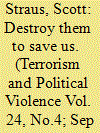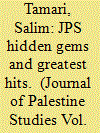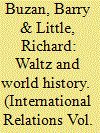| Srl | Item |
| 1 |
ID:
114672


|
|
|
|
|
| Publication |
2012.
|
| Summary/Abstract |
Based on an analytic review of recent scholarly advances in genocide studies, this article investigates the causes, concept, and logic of genocide while suggesting a set of theoretical propositions and avenues for future research. Two emerging theoretical streams of literature on causes-strategic and ideological-highlight different dimensions of genocide and should be thought of as compatible. The study of genocide should be embedded in a broader study of political violence; the two literatures have been strangely cloistered from each other. To that end, genocide should be conceptualized as group-selective, large-scale violence whose purpose is group destruction. This stands in contrast to violence that is individually selective or indiscriminate; small-scale and not sustained across time and space; and whose purpose is repression, communication, or some other outcome short of group destruction. To develop existing theory and to bring the study of genocide closer to the literature on violence, studying variation in outcomes is essential; that is, students of genocide should ask why genocide and not another outcome occurs, rather than only studying common patterns among genocide cases. Similarly, rather than study primarily sources of escalation and accelerators of violence, scholars should also theorize restraint and decelerators of violence. Further, scholars of genocide should focus attention on the interaction between national and sub-national actors as well as periods of escalation or de-escalation. In these ways and others proposed in the essay, genocide studies can build on recent gains and develop a broader and more coherent field of theoretical inquiry.
|
|
|
|
|
|
|
|
|
|
|
|
|
|
|
|
| 2 |
ID:
178797


|
|
|
|
|
| Summary/Abstract |
In this essay, emeritus sociology professor Salim Tamari surveys the study of Ottoman Palestine within the pages of JPS, identifying two groundbreaking articles: Beshara Doumani’s “Rediscovering Ottoman Palestine: Writing Palestinians into History” (1992) and Louis Fishman’s “The 1911 Haram al-Sharif Incident: Palestinian Notables versus the Ottoman Administration” (2005). Tamari argues that the two contributions have, in different ways, fundamentally shifted our understanding of a local Palestinian identity within the broader Ottoman-era region of Bilad al-Sham.
|
|
|
|
|
|
|
|
|
|
|
|
|
|
|
|
| 3 |
ID:
092040


|
|
|
|
|
| Publication |
2009.
|
| Summary/Abstract |
This article provides a critique of Waltz's work from the perspective of world history. It shows how Waltz's commitment to a highly parsimonious theoretical approach paradoxically both sets up the possibility of his theory being universally applicable, and undermines its prospects as a viable approach to understanding world history. Using the key concepts from Waltz's work - units, systems, structure, process - we show the detailed grounds on which his theory fails to apply to such large swathes of time and place, so that its claims to universality fall, even though it can usefully be applied to some times and places. We also show its shortcomings in relation to the essential historical task of periodization. We argue that international relations needs to engage more with world history, and that the task of doing so will fall to approaches other than Waltz's.
|
|
|
|
|
|
|
|
|
|
|
|
|
|
|
|